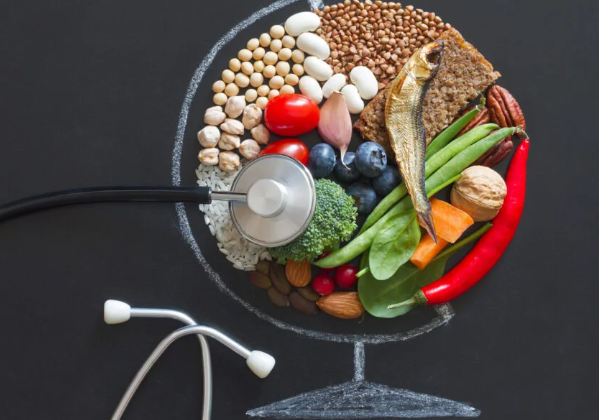
Healthy eating isn’t just a lifestyle choice; it’s a commitment to wellness that supports your mind, body, and spirit. Let’s explore the many benefits of healthy eating through these major advantages and practical insights.

Boosts Physical Health and Immunity
- Stronger Immune System: Nutrient-rich foods like fruits, vegetables, and whole grains support the immune system by providing vitamins (such as Vitamin C, D, and A) and minerals (like zinc and selenium) essential for fighting infections and reducing inflammation.
- Lower Risk of Chronic Diseases: A balanced diet with a variety of nutrients can reduce the risk of chronic conditions like diabetes, heart disease, and certain cancers. Whole foods provide antioxidants that protect cells from damage.
- Improved Digestive Health: High-fiber foods like vegetables, whole grains, and legumes aid in digestion, prevent constipation, and support a healthy gut microbiome, which is crucial for overall health.
- Healthy Weight Management: Nutrient-dense foods keep you full longer, reducing cravings and helping you control your weight naturally.

Improves Mental Health and Cognitive Function
- Enhanced Mood and Energy Levels: Eating a balanced diet helps stabilize blood sugar levels, preventing energy spikes and crashes that affect mood. Foods rich in omega-3 fatty acids, like salmon and walnuts, help reduce symptoms of depression and anxiety.
- Better Brain Function and Memory: Antioxidant-rich foods, such as berries and leafy greens, protect brain cells from oxidative stress, supporting cognitive functions and memory. Additionally, whole grains provide sustained energy to the brain.
- Reduced Risk of Cognitive Decline: Nutrients like folate, vitamin K, and omega-3 fatty acids may delay or reduce cognitive decline and reduce the risk of Alzheimer’s and other age-related cognitive diseases.

Increases Energy and Vitality
- Steady Energy Levels: Whole foods provide consistent energy by slowly releasing glucose into the bloodstream. Processed foods, on the other hand, can lead to spikes and crashes in energy.
- Better Physical Performance: Healthy fats, proteins, and complex carbohydrates fuel your body more effectively for physical activities, be it a workout, hiking, or day-to-day chores.
- Enhanced Resilience and Endurance: With a nutrient-rich diet, you’re likely to recover faster from exertion and have a greater capacity for physical endurance, allowing you to stay active longer.

Promotes Healthy Skin, Hair, and Nails
- Youthful, Glowing Skin: Nutrients like vitamin C (found in citrus fruits), vitamin E (from nuts and seeds), and collagen-boosting proteins work together to give your skin a healthy glow.
- Strong Hair and Nails: Protein, biotin, iron, and omega-3 fatty acids contribute to hair and nail health, making them strong and less prone to breakage.
- Slows Signs of Aging: Antioxidants found in berries, nuts, and dark chocolate help combat the effects of aging by reducing cellular damage.

Supports Heart Health
- Reduced Cholesterol Levels: Healthy fats (like those in avocados, nuts, and olive oil) help lower bad cholesterol levels, reducing the risk of artery blockages and heart disease.
- Lower Blood Pressure: Potassium-rich foods, such as bananas and leafy greens, aid in managing blood pressure, helping to reduce the risk of stroke and other heart conditions.
- Improved Blood Circulation: Leafy greens and berries contain nitrates that improve blood vessel function, supporting better circulation and heart health.

Enhances Longevity and Quality of Life
- Increased Life Expectancy: Studies show that people who eat more fruits, vegetables, and whole grains tend to live longer, healthier lives.
- Better Quality of Life: Eating healthy promotes higher energy, less chronic pain, and better mental and physical health, allowing you to enjoy life to the fullest.
- Reduced Healthcare Costs: Maintaining good health through diet lowers the chances of hospitalization and the need for medication, reducing healthcare expenses over time.

Environmental Benefits of Eating Healthy
- Reduced Carbon Footprint: Plant-based foods generally require fewer resources to produce than meat and processed foods, helping to reduce carbon emissions.
- Supports Sustainable Agriculture: Choosing whole, organic, and locally sourced foods can promote sustainable farming practices, contributing to environmental health.
- Less Waste and Pollution: Eating minimally processed foods leads to less packaging waste and reduced pollution from production and transportation.

Builds Healthy Habits for Life
- Increases Mindful Eating: Focusing on whole foods encourages awareness of what you consume, helping you make conscious choices that support your health.
- Positive Influence on Others: Your healthy habits can inspire friends and family to follow suit, creating a positive ripple effect in your community.
- Encourages Self-Discipline and Wellness: Developing a habit of eating healthy builds self-discipline that can extend to other areas of life, promoting overall wellness.
Conclusion
Eating healthy is more than a trend—it’s a sustainable lifestyle change that leads to long-lasting physical, mental, and emotional benefits. The rewards of eating a balanced, nutrient-rich diet extend far beyond the dinner table, impacting nearly every aspect of life. Start small, make one healthy choice at a time, and you’ll soon see these amazing benefits manifest in your life.
FAQ’s
1. What exactly does “eating healthy” mean?
Eating healthy generally means consuming a balanced variety of nutrient-dense foods that fuel your body and support overall health. This includes plenty of fruits, vegetables, whole grains, lean proteins, and healthy fats, while limiting processed foods, added sugars, and excessive salt. Healthy eating doesn’t mean strict dieting or depriving yourself; rather, it’s about enjoying wholesome foods in the right proportions to meet your body’s nutritional needs.
2. How does healthy eating affect my energy levels?
Healthy eating can significantly boost energy levels by providing your body with sustained fuel. Whole grains, lean proteins, and healthy fats release energy steadily, preventing the blood sugar spikes and crashes that lead to fatigue. High-fiber foods also aid in digestion and keep you feeling full longer, maintaining consistent energy throughout the day. Processed foods, on the other hand, often cause energy highs and lows that leave you feeling drained. By focusing on balanced, whole foods, you can experience better, more sustained energy.
3. Can eating healthy help with weight management?
Yes, healthy eating is one of the most effective ways to manage weight sustainably. Nutrient-dense foods like fruits, vegetables, lean proteins, and whole grains have fewer calories relative to their volume, so they help you feel full without overeating. They also stabilize blood sugar, which reduces cravings and the risk of binge eating. By making these foods the basis of your meals, you can manage your weight naturally without extreme dieting or calorie counting.
4. Is healthy eating more expensive than a regular diet?
While healthy eating can sometimes appear more costly, especially with organic or specialty items, it doesn’t have to be expensive. Basic healthy foods like beans, oats, eggs, fresh vegetables, and seasonal fruits are often affordable and versatile. Buying in bulk, cooking at home, and planning meals around seasonal produce can help reduce costs. Over time, the health benefits of eating well can also reduce medical expenses related to chronic diseases, making it a wise investment.
5. How quickly can I expect to see benefits from eating healthy?
Some benefits of healthy eating, like improved energy levels and better digestion, can be noticeable within a few days to weeks. Mental clarity and mood improvements often follow as well. For long-term benefits like reduced risk of chronic disease, it may take months or even years of consistent healthy eating, but these effects are cumulative and profoundly impactful. The key is to make healthy eating a lifelong habit, with both short-term and long-term gains that contribute to an improved quality of life.